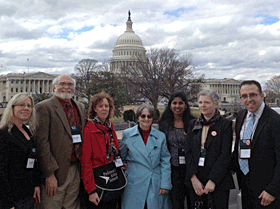Parkinsons Action Network 2013
It was my tremendous pleasure to attend the Parkinson's Action Network's (PAN) Research and Public Policy Forum that was held in Washington, D.C from February 25, 2013 through February 27, 2013 on behalf of the PND association. Since I have been attending the forum since 2007, it felt like attending a family reunion, thanks to my great team members from NJ, Myra Hirschhorn, Lori Katz, Sid Katz, Joe Narciso, Susan Hacker, and Lisa Griffin.
PAN is the unified voice of the Parkinson's community advocating for better treatments and a cure. PAN partners with other Parkinson's organizations, and using its powerful grassroots network, it educates the public and government leaders on better policies for research and improved quality of life for people living with the disease. For more information about PAN and its advocacy efforts, please visit www.parkinsonsaction.org.
Our goal for attending the forum is to use this event as a perfect opportunity to learn about the latest treatment options for Parkinson's disease (PD) that may potentially benefit our children, to introduce our population to PAN, and also to the researchers, government agency leaders, and policy makers in Capitol Hill.
The first two days of the forum involve conversations with researchers providing updates on the latest advancements in Parkinson's research and training sessions to hone the participants' lobbying skills. The speaker panel consisted of top PD researchers not only from the academia but also from private biomedical companies both small and large alike, and leaders that oversee major government agencies such as the National Institutes of Health (NIH), National Institute of Neurological Disorders and Stroke (NINDS), and National Center for Advancing Translational Sciences (NCATS). Also in attendance were leaders of all the other major Parkinson's organizations from across the country, who also serve as board members of PAN, so they can all work together in one strong voice in the advocacy efforts in Capital Hill.
For the first time this year, PAN invited some of the brightest post-doctoral fellows from top universities to present their research findings on PD and to showcase a poster board session to answer questions that attendees can have. I had the opportunity to introduce myself to some of them and our disease population. I am in the process of following up with them, so if they develop any interest in the future, they can apply for our research grant program.
One of the topics that I found very fascinating was the discussion about telemedicine. The department of Neurology and Neurosurgery at Johns Hopkins University has started a global telemedicine clinic to improve access for patients with Parkinsons disease. Their vision is to provide patient-centered care to any patient, anywhere. This field seems to be in infancy in the US, but in the future, if it becomes widely available, it may benefit our children to follow up with their physician right from the comfort of their homes, when traveling long distance can be a huge barrier to accessing the right care.
Currently, they are offering a free one-time consultations via web-based videoconferencing with a Johns Hopkins specialist to any Parkinson's patient living in California, Delaware, Florida, Maryland, and New York and internationally. If anyone you know with Parkinson's disease is interested, he or she can call (855)-237-7446 or check on facebook at https://facebook.com/parkinsonstelemed.
It is not easy to grab the attention for our disease population in a conference that is devoted to Parkinson's advocacy, but even a few minutes of encounter with key people, for example, the CEO of Michael J. Fox foundation is worth the effort for our representation in the conference. Nancy Speller has been envisioning a partnership with Michael J. Fox foundation for many years, and through her persistence, we had a teleconference with their foundation staff in October, 2012, and my brief discussion with Todd Sherer, the CEO of the foundation helped us to arrange another meeting with them in the very near future. Networking like this takes years of perseverance, and the PND board works diligently to secure such connections to bring visibility to all of our PNDs.
The third day of the forum is the highlight of the event. The participants are divided into teams according to their states, and they get a chance to visit Capitol Hill to meet with their local House of Representatives and Senators. Each of our NJ team members story was unique, but we made a great team in conveying our message to our legislators that budget cuts to biomedical research funding will not only have impact on individual families but also on the economic output of the entire nation.
It is estimated that PD alone costs the nation $14 billion dollars annually. Even though we were at the Hill at a very difficult time during sequestration negotiations, it is crucial that we keep attempting for our voices to be heard.
I would encourage families to be in touch with their local representatives whenever the opportunity arises. Please visit http://www.parkinsonsaction.org/parkinsons-disease/webcasts-1 to learn about the power of advocacy and other informational webcasts.
It was a great pleasure for me to attend the PAN forum again this year and I thank the PND association for giving me the opportunity.
Priya Kannusamy

